- Home
- Maggie O'Farrell
Hamnet Page 3
Hamnet Read online
Page 3
John’s business still thrives, after a fashion, because people will always need gloves, and if these men know of his secret dealings in the wool trade, his summons for not attending church and fines for dumping waste in the street, so be it. John can take in his stride their disapproval, their fines and their demands, their snide mutterings about the ruination of his family, the exclusion from guild meetings. His house is one of the finest in the town: there is always that. What John cannot bear is that not one of them will take a drink with him, will break bread at his table, will warm themselves at his hearth. Outside the guildhall, the men avoid his eye, continue their conversation. They don’t listen to his prepared speech about the reliability of the glove trade, about his successes, his triumphs, his invitations to a tavern, to eat dinner at his house. They nod distantly; they turn away. One pats his arm, says, aye, John, aye.
So he goes to the tavern alone. Just for a while. Nothing wrong with a man’s own company. He will sit here, in the half-light, like that of dusk, a candle stub on the table before him, and watch as stray flies circle and circle in its light.
Judith is lying on the bed and the walls appear to be bulging inwards, then flexing back. In, out, in, out. The posts around her parents’ bed, in the corner, writhe and twist like serpents; the ceiling above her ripples, like the surface of a lake; her hands seem at once too close and then very far away. The line where the white of the plasterwork meets the dark wood of the joists shimmers and refracts. Her face and chest are hot, burning, covered with slick sweat, but her feet are ice-cold. She shivers, once, twice, a full convulsion, and sees the walls bend towards her, closing in, then pulling away. To block out the walls, the serpentine bedposts, the moving ceiling, she shuts her eyes.
As soon as she does so, she is elsewhere. In many places at once. She is walking through a meadow, holding tight to a hand. The hand belongs to her sister, Susanna. It has long fingers and a mole on the fourth knuckle. It does not want to be held: the fingers aren’t curled around Judith’s, but kept stiff and straight. Judith has to grip with all her might for it not to slide from her. Susanna takes great steps through the long grass of the meadow and with each one her hand jerks in Judith’s. If Judith lets go, she may sink beneath the surface of the grass. She may be lost, never to be found. It is important – crucial – for her to keep hold of this hand. She must never let go. Ahead of them, she knows, is her brother. Hamnet’s head bobs in and out of the grass. His hair is the colour of ripe wheat. He bounds through the meadow, ahead of them, like a hare, like a comet.
Then Judith is in a crowd. It is night-time, cold; the glow of lanterns punctuates the freezing dark. She thinks it is the Candlemas fair. She is in and also above a crowd, on a pair of strong shoulders. Her father. Her legs grip his neck and he holds her by each ankle; she has buried her hands in his hair. Thick dark hair he has, like Susanna’s. She uses the smallest of her fingers to tap the silver hoop in his left ear. He laughs at this – she feels the rumble of it, like thunder, pass from his body to hers – and shakes his head to make the earring rattle against her fingernail. Her mother is there, and Hamnet and Susanna, and her grandmother. Judith is the one her father has chosen to ride on his shoulders: just her.
There is a great flaring of light. Braziers are bright and fierce around a wooden platform, raised to the level of herself, there, on her father’s shoulders. On the platform are two men, dressed in gold and red clothing, with many tassels and ribbons; they have tall hats on their heads and their faces are white as chalk with blackened eyebrows and reddened lips. One lets out a high, keening cry and hurls a golden ball at the other; he flips himself on to his hands and catches the ball in his feet. Her father lets go of her ankles to applaud and Judith clutches at his head. She is terrified she might fall, tip back, off his shoulders and into the seething, restive crowd that smells of potato peelings, of wet dog, of sweat and chestnuts. The man’s cry has set fear in her heart. She doesn’t like the braziers; she doesn’t like the men’s jagged eyebrows; she doesn’t like any of this at all. She begins, quietly, to weep, the tears coursing from her cheeks to rest like pearls in her father’s hair.
Susanna and her grandmother, Mary, are not yet home. Mary has stopped to talk to a woman of the parish: they barter compliments and demurrals, pat each other on the arm but Susanna isn’t fooled. She knows the woman does not like her grandmother; the woman can’t stop looking around, over her shoulder, wondering if anyone is observing her in conversation with Mary, wife of the disgraced glover. There are many in the town, Susanna knows, who were once their friends and now cross the street to avoid them. It has been going on for years, but ever since her grandfather was fined for not attending church, many of the townsfolk have dropped the pretence of civility and will walk past without acknowledging them. Susanna sees how her grandmother plants herself in the woman’s way, so that she cannot get past, cannot avoid talking to them. She sees all of this. The knowledge of it burns the inside of her head, leaving black scorch marks.
Judith lies alone on her bed, opening and closing her eyes. She cannot comprehend what has happened to this day. One moment, she and Hamnet were pulling bits of thread for the cat’s new kittens – keeping an eye open for their grandmother, because Judith had been told to chop the kindling and polish the table while Hamnet did his schoolwork – and then she had suddenly felt a weakness in her arms, an ache in her back, a prickling in her throat. I don’t feel well, she’d said to her brother, and he had looked up from the kittens, at her, and his eyes had travelled all over her face. Now she is on this bed and she has no idea how she got here or where Hamnet has gone or when her mother is coming back or why no one is there.
The maid is taking a long time to make her selection from the late milking at the market, flirting with the dairyman behind his stall. Well, well, he is saying, not letting go of the pail. Oh, the maid is replying, tugging at the handle. Will you not let me have it? Have what? the dairyman says, raising his eyebrows.
Agnes has finished collecting her honey and has taken up a sack and the burning rosemary and is making for the swarm of bees. She will sweep them into the sack and return them to the hive, but gently, ever so gently.
The father is two days’ ride away, in London, and is, at this very moment, striding through Bishopsgate towards the river, where he aims to buy one of the flat, unleavened griddle cakes that sell on stalls there. He has a terrible hunger in him today; he woke with it, and his breakfast of ale and porridge and his lunch of pie has not sated it. He is careful with his money, keeping it close to his person, never spending more than he has to. It is the subject of much ribbing from those he works with. People say of him that he has gold stored in bags under the boards of his lodging: he has heard this and smiled. It is, of course, not true: everything he earns he sends home to Stratford, or takes with him, wrapped and stowed in his saddlebags, if he is making the journey. But, still, he doesn’t spend a groat unless absolutely necessary. And this day the griddle cake, in mid-afternoon, is such a necessity.
Alongside him walks a man, the son-in-law of his landlord. This man has been talking since they left the house. Hamnet’s father is listening only intermittently to what the man is saying – something about a grudge towards his father-in-law, a dowry unfulfilled, a promise not kept. He is thinking instead of the way the sun reaches down, like ladders, through the narrow gaps in buildings to illuminate the rain-glazed street, of the griddle cake that awaits him near the river, of the flap and soap-tang of laundry hanging above his head, of his wife, fleetingly, the way her twinned shoulder-blades flex together and apart as she pins up the weight of her hair, of the stitching in the toe of his boot that seems to have worked itself loose and how he must now pay a visit to the cobbler, perhaps after he has eaten his griddle cake, as soon as he has rid himself of the landlord’s son-in-law and his querulous babbling.
And Hamnet? He is re-entering the narrow house, built in a gap, a vacancy. He is sure, now, that other people will be back. He and Judith w
ill no longer be alone. There will be someone here now who will know what to do, someone to assume charge of this, someone who will tell him that all is well. He steps in, letting the door swing closed behind him. He calls, to say he is back, he is home. He pauses, waiting for an answer, but there is nothing: only silence.
f you were to stand at the window in Hewlands and crane your neck sideways, it would be possible to see the edge of the forest.
You might find it a restless, verdant, inconstant sight: the wind caresses, ruffles, disturbs the mass of leaves; each tree answers to the weather’s ministrations at a slightly different tempo from its neighbour, bending and shuddering and tossing its branches, as if trying to get away from the air, from the very soil that nourishes it.
On a morning in early spring, fifteen years or so before Hamnet runs to the house of the physician, a Latin tutor is standing in this place at the window, absently tugging on the hoop through his left ear. He is watching the trees. Their collective presence, lined up as they are, fringing the edge of the farm, brings to his mind the backdrop of a theatre, the kind of painted trickery that is unrolled, quickly, into place to let the audience know they are now in a sylvan setting, that the city or streets of the previous scene are gone, that they are now on wooded, uncultivated, perhaps unstable ground.
A slight frown appears on his face. He remains at the window, the fingertips of one hand pressed white to the glass. The boys are behind him; they are conjugating verbs, temporarily unheard by the tutor, who is intent on the startling contrast between the sharply blue spring sky and the new-leaf green of the forest. The colours seem to fight, vying for supremacy, vibrancy: the green versus the blue, one against the other. The children’s Latin verbs wash over him, through him, like the wind through the trees. Somewhere in the farmhouse a bell is rung, first briefly and then more insistently. There are footfalls along the passage, the sound of a door banging into its frame. One of the boys – the younger one, James, the tutor knows, without turning – sighs, coughs, clears his throat, then rejoins the intoning. The tutor readjusts his collar, smooths his hair.
The Latin verbs roll on and on, around him, like a fenland fog, through his feet, up and over his shoulders, past his ears, to seep out of the cracks in the window lead. He allows the chanted words to merge into an aural blur that fills the room, right to its high, blackened rafters. It collects up there, along with the curls and veils of smoke from the chimneyless fire that smoulders in the grate. He has instructed the boys to conjugate the verb ‘incarcerare’: the repeated hard c sound seems to scrape at the walls of the room, as if the very words themselves are seeking escape.
The tutor is forced to come here twice a week by his father, the glover, who is in some manner of debt to Hewlands, after the souring of an agreement or deal with the yeoman who used to own the farm. The yeoman had been a broad-backed man who carried through his belt a sheep-hook shaped like a cudgel, and there was something about his open, candid face that the tutor had rather liked. But the yeoman had died suddenly last year, leaving all his acres and flocks, along with a wife and eight or nine children (the tutor is unsure exactly how many). It was an event his own father had greeted with barely concealed glee. Only he knew of the nature of the loan: the tutor had overheard his father crowing, late at night, when he thought no one could overhear (the tutor is very good at clandestine listening): Don’t you see? The widow will not know or, if she does, will not dare to come and ask me to make good on it, or that overgrown dullard of an eldest son.
It appears, however, that the widow or son has done just that and this arrangement (the tutor has gleaned, from listening in to conversations going on behind the door of his parents’ chamber) is something to do with what his father did with a consignment of the yeoman’s sheepskins. His father had told the yeoman that the hides were to be sent for whittawing and the yeoman had believed him. But then his father had insisted that the wool should be left on, which had aroused the suspicion of the yeoman, which for some reason has caused all this trouble. The tutor is unclear on this last point as his mother was called away from the whispered conversation by the querulous, creaking cry of Edmond, her youngest child.
The tutor’s glover father has some new, slightly illicit venture that none of them are supposed to know about: this much the tutor can tell. They were to make out, their parents told them, to anyone who asked, that the sheepskins were for gloves. He and his siblings had been baffled as it had not occurred to them that the skins were for anything other than gloves. Whatever else could his father, the most successful glover in town, possibly want them for?
There is a debt or a fine and their father cannot – will not? – pay, and the yeoman’s widow or son will not let it drop so it appears that he himself is the payment. His time, his Latin grammar, his brain. Twice a week, his father told him, he must walk the mile or so out of town, along the stream, to this low-lying hall, surrounded by sheep, where he must run the younger boys through their lessons.
He had had no warning of this plan, this web being spun around him. His father had called him into the workshop one evening, as the household was preparing for bed, to tell him that he was to go to Hewlands to ‘start drumming some education into the boys there’. The tutor had stood in the doorway and stared hard at his father. When, he asked, was this arranged? His father and mother had been wiping and polishing the tools in preparation for the next day. Doesn’t concern you, his father said. All you need to know is that you are going. What, the son replied, if I don’t care to? The father fitted a long knife back into its leather sleeve, seemingly without hearing this response. His mother had glanced at her husband, then at her son, giving him a minute shake of her head. You’ll go, his father said eventually, laying down his rag, and there’s an end to it.
The desire to push himself away from these two people, to stride out of the room, to wrench open the front door and run into the street rose in the son, like sap in a tree. And, yes, to strike his father, to do some harm to that body, to take his own fists and arms and fingers and give back to this man all that had been dealt to him. They had, all six of them, from time to time, received the blows and grips and slaps that resulted from the father’s temper, but with nothing like the regularity and brutality of this eldest son. He didn’t know why but something about him had always drawn his father’s anger and frustration to him, like a horseshoe to a magnet. He carried within him, always, the sensation of his father’s calloused hand enclosing the soft skin of his upper arm, the inescapable grip that kept him there so his father could rain down blows with his other, stronger, hand. The shock of a slap landing, sudden and sharp, from above; the flensing sting of a wooden instrument on the back of the legs. How hard were the bones in the hand of an adult, how tender and soft the flesh of a child, how easy to bend and strain those young, unfinished bones. The doused, drenched feeling of fury, of impotent humiliation, in the long minutes of a beating.
His father’s rages arrived from nowhere, like a gale, then blew quickly on. There was no pattern, no warning, no rationale; it was never the same thing twice that tipped him over. The son learnt, at a young age, to sense the onset of these eruptions and a series of feints and dodges to avoid his father’s fists. As an astronomer reads the minuscule shifts and alterations in the alignment of the planets and spheres, to see what lies in store, this eldest son became an expert in reading his father’s moods and expressions. He could tell, from the sound the front door made when his father entered from the street, from the rhythm of his footsteps on the flagstones, whether or not he was in for a beating. A spilt ladle of water, a boot left in the wrong place on the floor, a facial expression deemed insufficiently respectful – any of these might be the excuse the father sought.
In the last year or so, the son has grown tall, taller than the father: he is stronger, younger, faster. His walks to various local markets, to outlying farms, to and from the tannery, with sacks of skins or finished gloves on his back, have brought muscle and weight to his should
ers and neck. It has not eluded the son’s notice that his father’s blows have, of late, tailed off. There was a moment, several months ago, when the father came out of his workshop late in the evening and, finding the son in the passageway, without a word, bore down on him and, lifting the wineskin he was holding, lashed the son about the face. The pain was of the stinging sort, not aching, not bruising, not pressing: it had a sharp, whipped, lacerating quality. There would, the son knew, be a red, broken mark on his face. The sight of the mark seemed to enrage the father further because he lifted his arm again, for a second blow, but the son reached up. He seized his father’s arm. He pushed, with all his might, against him and found, to his surprise, that his father’s body yielded under his. He could push this man, this leviathan, this monster of his childhood, back against the wall with very little effort. He did so. He kept his father there with the point of his elbow. He shook his father’s arm, like that of a puppet, and the wineskin dropped to the floor. He leant his face into his, noticing at the same time that he was looking down on him. That, he said to him, is the last time you will ever hit me.
As he stands at Hewlands’ window, the need to leave, to rebel, to escape is so great it fills him to his very outer edge: he can eat nothing from the plate the farmer’s widow left for him, so crammed is he with the urge to leave, to get away, to move his feet and legs to some other place, as far away from here as he can manage.

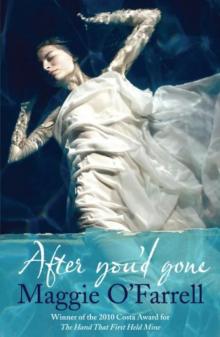 After You'd Gone
After You'd Gone The Hand That First Held Mine
The Hand That First Held Mine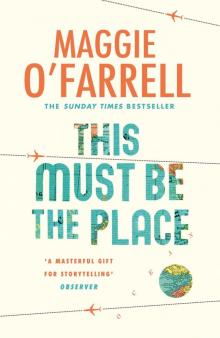 This Must Be the Place
This Must Be the Place My Lover's Lover
My Lover's Lover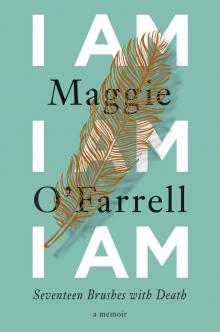 I Am, I Am, I Am: Seventeen Brushes With Death
I Am, I Am, I Am: Seventeen Brushes With Death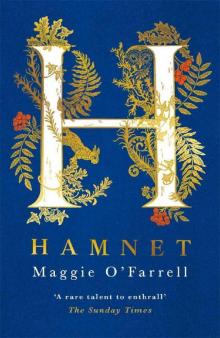 Hamnet
Hamnet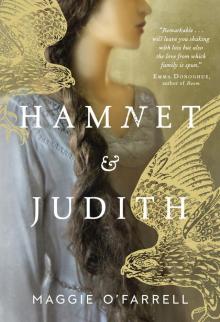 Hamnet and Judith
Hamnet and Judith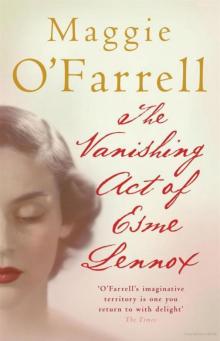 The Vanishing Act of Esme Lennox
The Vanishing Act of Esme Lennox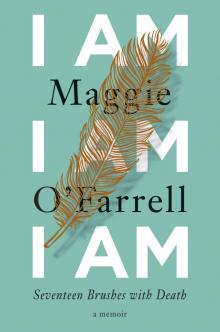 I Am, I Am, I Am
I Am, I Am, I Am